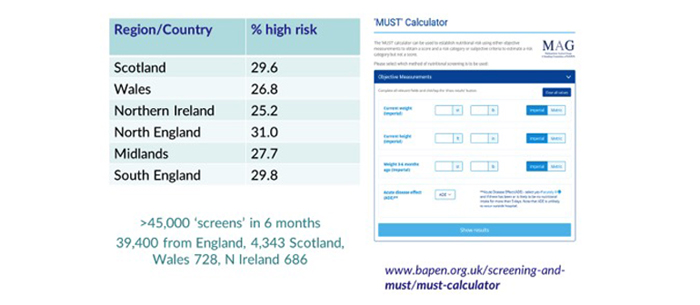Committee, Council & SIG Updates
Malnutrition Action Group (MAG)

Rebecca Stratton, Chair, Malnutrition Action Group
Email: R.J.Stratton@soton.ac.uk
Website: www.bapen.org.uk/about-bapen/committees-and-groups/malnutrition-action-group
‘MUST’ calculator indicates high prevalence of malnutrition across the UK
We have collated a summary of the screening results from the ‘MUST’ calculator (www.bapen.org.uk/screening-and-must/must-calculator) and the ’MUST’ self-screening tool (www.malnutritionselfscreening.org).
Over 6 months in 2018, there were over 45,000 ‘screens’ on the ‘MUST’ calculator (87% from England, 10% Scotland, Wales 1.6%, N. Ireland 1.5%). The prevalence of high risk of malnutrition ranged from 25.2% in N. Ireland to 29.8% in Southern England (see Figure 1). These results are higher than previously reported data, which may reflect a more selective use of the ‘MUST’ calculator for patients thought to be at risk. We will explore the data further.
Figure 1: Summary of malnutrition (% high risk) in the UK based on BAPEN ‘MUST’ calculator

‘MUST’ self-screening tool results
During October 2018, we assessed the number of screens using the ‘MUST’ self-screening tool (www.malnutritionselfscreening.org). Of 275 ‘screens’, around half of the results were low risk (51%), with 23% at medium risk and 16% at high risk. These results, which are higher than anticipated, may reflect the use of this tool by people concerned about malnutrition but this requires further exploration during 2019.
Nutritional Care Tool
We would like to thank all of those organisations who reported data in the Nutritional Care Tool in 2018 (see below) and to all of those who took part in the survey by Dulcie Belvir around usage of the Tool. Watch out for a summary of your feedback and next steps in the coming months.
The Tool continues to be active and free to use and has the new export function, allowing reporters to get their organisations’ results out.
Organisations reporting data in the Nutritional Care Tool in 2018 (n 15)
- Doncaster and Bassetlaw Hospitals NHS Foundation Trust
- St Helens and Knowsley Teaching Hospitals NHS Trust
- The Clatterbridge Cancer Centre NHS Foundation Trust
- North West Boroughs Healthcare NHS foundation Trust
- County Durham and Darlington NHS Foundation Trust
- Lancashire Teaching Hospitals NHS Foundation Trust
- Wirral University Teaching Hospital NHS Foundation Trust
- West Suffolk Hospital
- 2gether NHS Foundation Trust
- Norfolk Community Health Care Trust
- East Sussex Healthcare NHS Trust
- Milton Keynes University Hospital
- West Hertfordshire Hospitals NHS Trust
- University Hospitals Leicester
- Hampshire Hospitals NHS Foundation Trust.
Malnutrition screening in 2019
This year we look forward to encouraging a nationwide focus on screening for malnutrition during the UK Malnutrition Awareness Week in October 2019. More information to come!
The Nutrition Society

Dr Bernadette Moore, University of Leeds, The Nutrition Society Clinical/Medical Advisory Council member
Email: office@nutritionsociety.org
Website: www.nutritionsociety.org
Twitter: @Nutritionsoc
Instagram: the_nutrition_society
LinkedIn: /nutrition-society
Myself and several colleagues from The Nutrition Society very much enjoyed attending last November’s BAPEN Conference in Harrogate, meeting and speaking to many of you throughout the two-day conference, at the Society’s stand, and of course at the well-attended conference dinner. In addition to my talk on sugar taxes as part of symposium nine on sugar, the Society was honoured to co-host a joint symposium with the BSNA on day one of the conference entitled ‘Gastrophysics and the ‘Shape’ of Food – A way forward to tackle malnutrition’. Many congratulations to everyone involved in organising such a busy and engaging conference.
December saw the Society’s own winter conference, ‘Optimal diet and lifestyle strategies for management of cardio-metabolic risk’, held in association with The Royal Society of Medicine, and well-attended by health and nutrition professionals from across the UK. The clinically focused conference agenda explored how diet and lifestyle factors can both contribute to, and modify the management of, cardio-metabolic risk. A write-up of all the presentations can be found here on our website.
Our upcoming Spring conference, ‘Inter-individual differences in the nutrition response: from research to recommendations’ will be held 1-2 April in Dundee, Scotland, and BAPEN members are welcome to attend. As most doctors and dietitians are well aware, what works for one person, will not necessarily work for another. It is now clear that the effects of nutrition on health differ in individuals of different ethnicities, genetics and sex. The conference will address the challenges presented by inter-individual variation in responses to nutrition, exploring new ways of conducting nutrition research and the development of appropriate dietary interventions in diverse populations. Early bird registration expires at midnight, 11 March. To register for a space, click here.
Cognisant of the numerous demands of modern life on time that I’m sure many of you will recognise, the Society’s Training Academy (NSTA) continues to go from strength-to-strength, offering a range of one-hour long webinars that cover a diverse range of nutrition-related topics. With upcoming topics including; ‘Vitamin D – the sunshine superstar or media hype?’, ‘Nutrition and the ageing immune system’, and ‘Probiotics in clinical practice’, I hope that the programme will also be useful for BAPEN members.
Finally, a reminder that the Nutrition Society will host the Federation of European Nutrition Societies (FENS) 13th European Nutrition Conference in Dublin, Ireland, this coming October. Held once every four years, the conference will attract a wide variety of delegates from across Europe and from further afield. This year’s theme is ‘Malnutrition in an Obese world: European perspectives’. The call for abstract submission is now open and BAPEN members are welcome to submit their work for the opportunity to present and be published in the Proceedings of the Nutrition Society (PNS). Further information about the conference can be viewed on the FENS website along with submission details.
